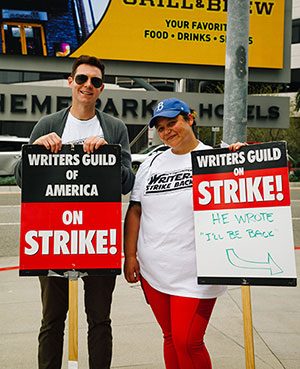You didn’t get the writing assignment. The spec you spent years crafting—countless late nights, rewritten drafts, canceled social plans—is rejected again. Opportunities in television dropped 42% between 2023 and 2024 and earnings for WGAW members fell 24.3% compared to 2022.To put it mildly, it’s a challenging time for writers.
Tasha Huo has some thoughts.
 Tasha Huo. Photo: Illiana Garcia
Tasha Huo. Photo: Illiana GarciaHuo is the writer of the upcoming sword-and-sorcery film Red Sonja. She also co-hosts the Act Two Podcast with Josh Hallman, where she talks craft and shares advice, such as how to keep going when you’re out of employment.
Huo’s first steps to staying motivated are inspired by her days as an assistant at Universal. “I scheduled blocks for every single hour of my day,” Huo said. “Think of it as being the executive of your own company. The more you can commit to those hours, the more successful that habit becomes.”
Behind closed doors, Huo also witnessed which writing got noticed by execs, so her suggestion: to let the imagination run wild. “When I saw a script hit, it was because it showed a point of view they had never seen before,” she said. “Between jobs, I always think, Now’s my time to write something original.”
In other words, create new opportunities for yourself. “The beauty of being a writer is that you can write yourself into a new phase of your career or a new job,” Huo added. “Studios are genuinely excited about new ideas, even if we love to complain about how they don’t make them.”
Once pens are down, computers are closed, and coffee is out, the work doesn’t stop. It’s then time to socialize. “Going to industry-related events is essential,” Huo said. “I can’t tell you how many times I’ve gotten a call to work on something because it was someone I met at an industry party, and we hit it off and became Facebook or Instagram friends. The more I go to events, festivals, and dinners, the more I hone my ability to talk about stories and think on the fly when I pitch.”

“The beauty of being a writer is that you can write yourself into a new phase of your career or a new job. Studios are genuinely excited about new ideas, even if we love to complain about how they don’t make them.
- Tasha Huo
Join a Writers’ Group, Encourage Each Other, and Have Fun
Huo’s writers’ group does “Idea Creation Night” to keep their minds active and engaged in storytelling. “We do a little 10-minute writing exercise at the beginning to get the juices flowing,” Huo said. “Then we played Pitchstorm—the Skybound game—which helps you think on your feet about story by creating a movie idea from a character and plot card.”
The creative exercise leads to a whirlwind of ideas to pluck from. “When we discussed the exercises afterward,” Huo added, “everyone helped and said, ‘Let’s turn this into your next movie idea, this is how I would do it, and these are my suggestions.’ If you didn’t come out with an idea, you still came out feeling jazzed about writing, and that is equally important.”
 Act Two Podcast hosts Tasha Huo Tasha and Josh Hallman on the Universal picket line in 2023.
Act Two Podcast hosts Tasha Huo Tasha and Josh Hallman on the Universal picket line in 2023.Also, a very crucial part of feeling good about your chosen profession: watch movies and read as much as humanly possible. “Consider it part of your job,” Huo added. “I go back to some of my favorite movies that got me excited as a kid about this job. Indiana Jones, Mission: Impossible, Harry Potter, and Lord of the Rings remind me that it's possible and how to do those stories well. Anything you can do to inject that childhood dream you had when you started, the better.”
That childhood dream didn’t include agents or managers.
When out of a job, though, try deepening those relationships. “The worst-case scenario is for your reps not to hear from you,” Huo said, “because it’s easy to be forgotten and for them to view you as a writer who isn’t trying. During lulls, I gather my reps together, have an in-person meeting, and talk about our goals: what I see for the next year and how we can achieve it together. My manager will ask, ‘What’s your priority?’ Then, we map out what I’m working on each week. I have marching orders. It’s important during that time to feel you have forward momentum.”
Huo’s final piece of advice for anyone waiting on that next gig to pay the bills—keep mining your life for scripts. Seek out stories. Have them ready for when you see a light at the end of a tunnel. “I’ve worked in construction and at a homeless shelter,” Huo said. “Ultimately, it’s good for writing. Life experience is invaluable. If you have to take a step back and get a day job, that’s still experience you can use. I’ve heard writers feel embarrassed saying, ‘I have a day job, working at a furniture store.’ That’s okay, because you’re still a writer. You’ll get through it and eventually sell something again, because you have talent. As long as you keep writing through this phase, you’ll be fine.”




